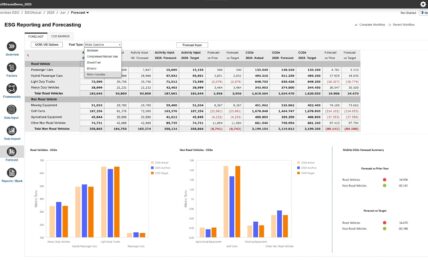By: Jamie C. Smith, EY Americas Center for Board Matters Investor Outreach and Corporate Governance Specialist
Investors are continuing to hold fast to their conviction that environmental and social factors can materially impact long-term financial value. Heading into the 2024 proxy season, nearly all – 98% − of the 50 investor stewardship leaders representing $50 trillion in assets under management told us they planned to focus as much or more on material environmental and social matters this year as in 2023.
Underscoring that point, investors cited workforce retention and development (63%) plus climate-related business transformation (56%) as top issues they want companies to prioritize this year, noting the importance of those matters to long-term business resilience. Further, many shared their views that anti-ESG campaigns are often misinformed, politically motivated, polarizing and distracting from underlying business risks.
On one hand, proxy season outcomes clearly reinforce this message: an early look at EY research shows that anti-ESG shareholder proposals surged in volume this year, with 58 reaching a vote at S&P 1500 companies through June 4, 2024, yet continued to garner just 2% support on average. On the other hand, declining support in recent years for many environmental and social proposals seems to send a different signal. Average support for those proposals has fallen from 33% in 2021 to just 20% this year.
How are companies and stakeholders to make sense of these seemingly mixed messages? Ultimately, investors’ selective support for environmental and social shareholder proposals reflects the nuances of investor voting on those proposals in a complex proxy landscape. More specifically, these results may signal the progress so many companies are making on their sustainability journeys although many have much more work to do.
A number of factors have contributed to the decline in support for environmental and social proposals in recent years. For instance:
SEC no-action guidance changed. An influx of more prescriptive proposals reached ballots in recent proxy seasons after the SEC’s approach changed to no-action requests in November 2021, making it more difficult for companies to exclude environmental and social shareholder proposals.[1] Across the S&P 1500, EY research found that the number of environmental and social shareholder proposals voted on jumped from 170 in 2021 to 279 in 2022, and then to 306 in 2023, declining to 226 through June 4, 2024.
Proposals became narrower and more prescriptive. For instance, some proposals called for greenhouse gas emission reduction targets focused exclusively on Scope 3 emissions. In some cases, proposals specified strategic and operational changes that large asset managers believe should be left to management’s decisions (e.g., calling for a time-bound phaseout of financing new fossil fuel projects). This year, proponents generally took a less aggressive approach compared to last year in terms of what the proposals requested. Still, proposals receiving the highest support tended to be the least prescriptive and focused on disclosure.
Companies have significantly enhanced their sustainability disclosures. As one example of company progress in this area, in 2022, 78% of the Russell 1000 reporting companies were aligned with Sustainability Accounting Standards Board (SASB) Standards, up from just 12% in 2019, according to the Governance & Accountability Institute, Inc.[2] Those standards are cited in many asset managers’ proxy voting guidelines and other policies. They also are now used in the IFRS Sustainability Disclosure Standards,[3] which form the global baseline for sustainability-related disclosure. As a result, large investors may perceive many disclosure-focused requests as redundant.
This last point about company progress is especially impactful. Part of the reason why proposals have become narrower and more prescriptive is that many companies are already meeting investors’ core sustainability disclosure expectations. The formula for strong voting support for environmental and social shareholder proposals (i.e., flexible and disclosure-focused) is difficult for proponents to pursue when there are fewer laggards left to target. Put another way, the low-hanging fruit is mostly gone.
In addition, investors may think some topics are better addressed through engagement or director votes than by seeking additional company reporting in an expansive and expanding reporting landscape. A third of investors told us that in the current environment, all other things being equal, they are more likely to vote against specific directors than to vote for a related shareholder proposal if they have concerns about the board’s oversight of material risks and opportunities.
In summary, investors’ lower support for environmental and social-focused shareholder proposals does not mean they are pulling back on ESG. It means they have recalibrated to a new shareholder proposal landscape marked by more robust company sustainability disclosures and narrower proposal requests. It also means that the work of engagement has become more important for companies seeking to understand investor perspectives and expectations related to sustainability governance, strategy and performance.
Ultimately, boards in their governance capacity should encourage management to engage with major shareholders throughout the year to better understand their views and communicate progress the organization is making. A director should join those conversations when appropriate. Such dialogues with both portfolio managers and stewardship leaders also can help boards and their organizations gain a fuller perspective of investor views.
Boards should also monitor how the company’s governance and disclosure practices compare with peers, particularly related to the focus areas raised by top shareholders. Through these actions and greater two-way communications, organizations and their boards can foster improved understanding of the organization and inspire confidence in the business.
The views reflected in this article are the views of the author and do not necessarily reflect the views of Ernst & Young LLP or other members of the global organization.
About the author:
Jamie C. Smith, the EY Americas Center for Board Matters Investor Outreach and Corporate Governance Specialist, helps boards and committee members in their oversight roles by providing insights to directors tackling complex boardroom issues. She also assists institutional investors and other governance community members with emerging trends and long-term developments in corporate governance. Jamie earned her master’s degree at the University of Chicago and her bachelor’s degree at the University of North Carolina, Chapel Hill.
[1] Shareholder Proposals: Staff Legal Bulletin No. 14L (CF), Division of Corporation Finance, U.S. Securities and Exchange Commission.
[2] 2023 Sustainability Reporting in Focus, Governance & Accountability Institute, Inc.
[3] IFRS – SASB Standards, IFRS.



